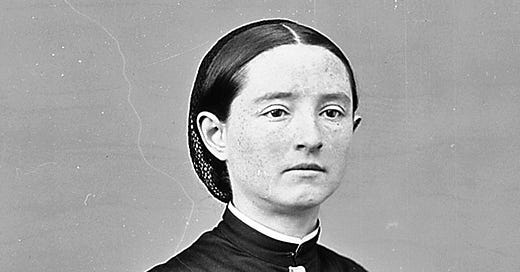Lately, some politicians have been fomenting a rather hysterical backlash among their flock around issues of drag queens, bathrooms, and gender fluidity. It might be worth a look at the story of Mary Edwards Walker, who stood up to the prejudice of another era. She was also the only woman in American history to be awarded the Congressional Medal of Honor.
Born in 1832 in Oswego, New York, Mary grew up on a farm near Lake Ontario. Her parents were freethinkers, who believed that opportunities and duties should fall equally to male and female. Her mother joined in heavy farm work, her father helped with household chores. He thought the corsets popular at the time were unhealthy and long skirts inconvenient. Mary and her four sisters dressed in apparel practical for farm girls.
Eager for all of their children to receive an education, the Walkers started a free school open to both boys and girls. Mary continued her learning at the Falley Seminary a few miles up the road in Fulton, one of the earliest colleges to admit women. On graduation, she began teaching school locally, but dreamed of becoming a doctor.
The Erie Canal corridor had become a highway of radical ideas. Walker’s parents were ardent abolitionists, their farm a station on the Underground Railroad that helped escaping slaves reach Canada. In 1848, when Mary was sixteen, advocates of women’s suffrage, including Lucretia Mott and Susan B. Anthony, held the first women’s rights convention in Seneca Falls, fifty miles south of Oswego. The following year, the medical school at nearby Geneva College awarded a degree to the first American female physician.
Saving money from her teacher’s pay, Mary Walker was able to cover the tuition at the Syracuse Medical College, where she herself received her medical degree in 1855. At her wedding to a fellow medical graduate, she struck the word “obey” from the vows—she continued to use her own last name. The couple opened a practice in Rome, New York, but resistance to a woman doctor proved a drag on business. After a few years, Mary split with her husband over his infidelity.
Walker became an enthusiastic agitator for causes ranging from temperance to labor justice. Her particular issue was dress reform. She insisted that the hoop skirts and crinoline petticoats of Victorian fashion were a burden and impediment to women. All her life she insisted on dressing in practical outfits, including trousers. Accused of masquerading as male, she stated, “I don’t wear men’s clothes, I wear my own clothes.”
In 1861, as the nation plunged into the Civil War and casualties mounted, Walker offered her services to the U.S. Army. Rejected as a medical officer because of her gender, she worked for a time as an unpaid volunteer surgeon at a makeshift hospital in Washington, D.C. Her duties were limited mostly to those of a nurse. She also established the Women's Relief Organization to aid relatives of soldiers searching for loved ones.
While Walker dealt firsthand with the gruesome carnage of battle, she fought her own war against a government bureaucracy that refused to acknowledge women as full-fledged physicians. Her repeated attempts to gain a commission as an army surgeon failed. The best she could do was to be named a civilian contract surgeon.
During her service she wore a uniform of her own design: an officer’s tunic, gold-striped trousers and a green surgeon’s sash. Once, a man accosted her for wearing “male habiliments.” She pulled out a revolver and fired a shot into the ground. The stranger fled.
In 1864, while crossing the lines to help both civilians and soldiers in northern Georgia, Mary was captured by Confederates. They held her prisoner for four months in a rat-infested tobacco warehouse. A Confederate officer described her as “a thing that nothing but the debased and depraved Yankee nation could produce—a ‘female doctor.’”
Following the war, President Andrew Johnson signed a bill awarding her the Medal of Honor, declaring she had “devoted herself with patriotic zeal to the sick and wounded soldiers . . . to the detriment of her own health. ”
For the rest of her life, Walker continued to advocate for women’s rights and other causes. Some in the suffrage movement were embarrassed by her strident lectures and eccentric dress, but she never wavered in her determination. “It is my motto to live by my principles,” she said.
She was arrested more than once for impersonating a man. At one court appearance, she asserted that she had the right “to dress as I please in free America on whose tented fields I have served for four years in the cause of human freedom.” The judge dismissed the case.
In 1917, two years before her death, Walker was stripped of her Medal of Honor on the grounds that she had served during the entire war as a civilian—males who had done the same retained the honor. The fact that the medal was only restored posthumously in 1977 would have been no surprise to Walker, who often mused, “It is the times which are behind me.”






Such an interesting article, Jack, and inspiring. And I must say I also love the photographs. I'm looking forward to reading many more of your writings.
As always, thanks Jack. Though I knew about Mary Walker, I so appreciate your insights. A brave woman of principles.